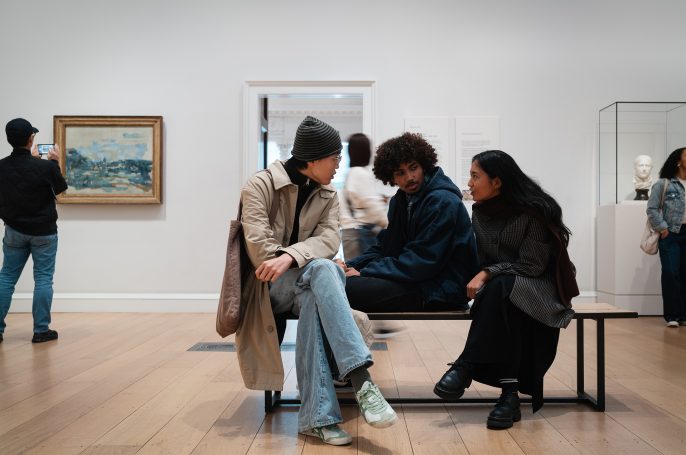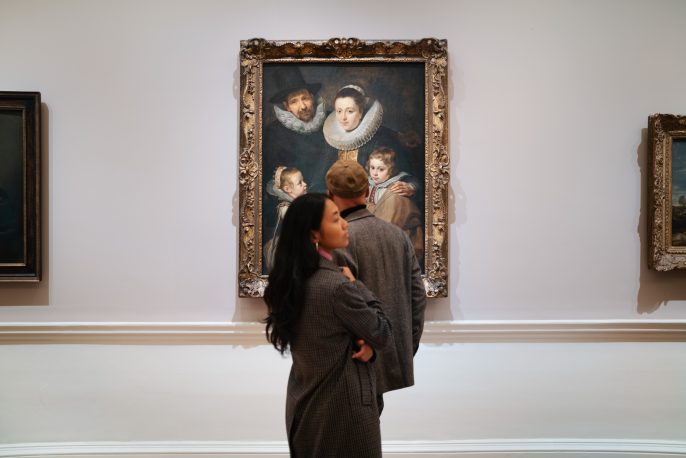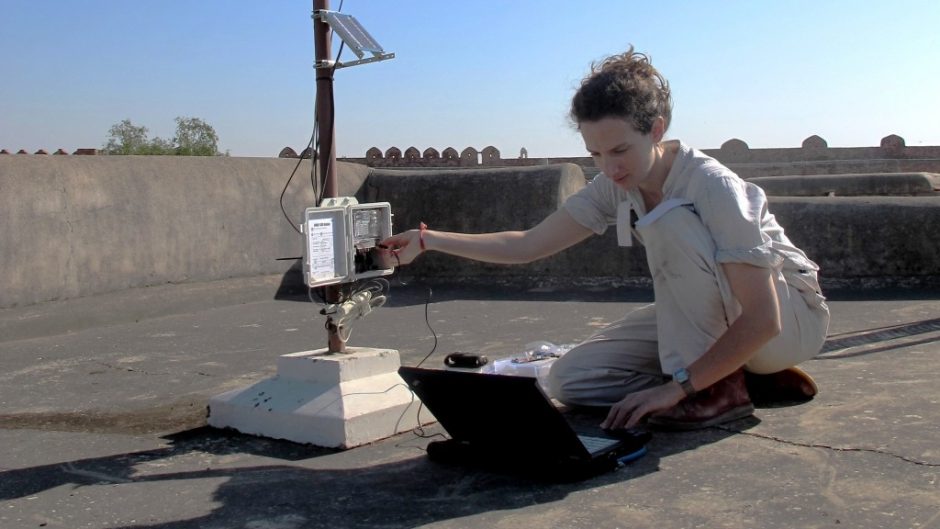Course Overview
Status
Applications open
Location
Somerset House, Strand, London WC2R 1LA, & Vernon Square, Kings Cross, London WC1X 9EP
Duration
12 months, full-time
Awarding body
University of London
Intake
12 students per year
Do you want to make a difference to the future preservation and care of our shared cultural heritage? The MA Preventive Conservation is a unique one-year full-time programme that will prepare you for a professional career in the heritage sector.
Preventive conservation does not involve the treatment of damaged cultural heritage, but rather addresses the causes of potential damage before it happens. These threats can take many forms, some more obvious than others – fire and flood damage may quickly come to mind, but cumulative deterioration caused by higher light levels, or very dry or humid conditions, can require specialist monitoring equipment to detect. Working as a preventive conservator, you could be using these monitoring systems daily, behind the scenes in a museum, to keep an eye on environmental conditions or even track the movements of insect pests. You could be asked to advise on the design and maintenance of museum spaces and new exhibitions, to make sure that collections are safely housed inside, or come up with strategies for salvage in the event of fire or flood.
The course will equip you with a sound understanding of the principles and practicalities of preventive conservation, giving experience in identifying, measuring and addressing potential threats to objects and allow you to collaborate with others to put these into practice through the development of new methods and strategies to preserve collections.
The MA Preventive Conservation at the Courtauld offers face-to-face teaching, tuition and mentoring in this fast-developing discipline. The degree is taught by in-house conservation and science specialists complemented by outside professionals with particular areas of expertise. While a strong emphasis is placed on the scientific underpinning of preventive conservation and the ethical frameworks used in decision making, students also acquire practical skills in identification of hazards to collections and the measurement of environmental parameters. The Conservation Department at the Courtauld possesses cutting edge scientific equipment, allowing students to carry out imaging and analysis that helps them to understand the materials they will encounter in collections.
Students benefit from studying alongside peers on the well-established and highly regarded MA programmes in easels painting conservation and wall painting conservation. In addition, collaboration with the Courtauld Gallery and with the department’s existing partners in the cultural heritage sector, all of whom who have day-to-day responsibility for the preventive care of collections, provides a setting for field trips and practical monitoring exercises, and potential topics for the end-of-programme project and dissertation.
Teaching and programme structure
Semester 1
The first semester focuses on a number of key areas that establish the theory and principles of preventive conservation and introduce the practical and intellectual skills needed by students. The programme begins by tracing the history of preventive conservation, its emergence as a discrete field of study and practice, the definition of the now well-established ‘agents of deterioration’ at the core of current practice and considering the ethical framework surrounding conservation decision-making.
Students are introduced to a broad range of historical materials found in collections and their interaction with the various agents of deterioration, including how scientific and technical study can inform this understanding. Topics covered will embrace photo-documentation, instrumental analytical methods, materials testing and chemical tests, and include guidance on selecting the appropriate techniques for a particular situation.
An emphasis is also placed on practical monitoring methods of monitoring deterioration processes and the agents of deterioration. Teaching will describe each agent, how it can be monitored and its impacts assessed. Assessment will include a monitoring exercise that familiarises students with different types of datalogger and the interpretation of the data produced.
Students will begin learning research skills to aid their preparation for subsequent modules and their final dissertation.
Semester 2
Teaching in the second semester strengthens students’ knowledge of preventive conservation theory and materials in cultural heritage objects and will move into applying this knowledge in situations likely to be encountered in future roles in the sector. The consideration of the principles and theory of preventive conservation will examine its interaction with interventive conservation treatments and look at how to commission and use expert advice and surveys. Emphasis will be placed on working with other professionals to establish priorities by assessing condition, value and significance, as a way to help develop policies and strategies.
Working together in small groups, students will conduct an environment survey project, using pre-existing environmental and condition data to consider a case study and offer their recommendations. A site visit helps to place taught elements in the context of a building and collection and highlights the practicalities of designing and implementing preventive conservation measures and monitoring programmes.
The development of research skills in the second semester will focus on helping students prepare a proposal for their MA dissertation project. Students will have a series of one-to-one tutorials to support their thesis research and writing, including a tutorial to review a draft submission.
Summer
In the Summer students work independently on their dissertation research to produce an 8000-word thesis. During their course students will also complete 100 hours of conservation volunteering at one or more heritage organisation. They will reflect on this experience in a short piece of writing for assessment and produce a short video or audio piece.
Teaching and Assessment
The teaching methods and types of assessments vary according to the content and objectives of each module within the programme.
Teaching consists of a combination of lectures, seminars, laboratory sessions, workshops, and site visits. In addition, students have timetabled meetings with tutors several times per term, to discuss progress and feedback from assessed work. Throughout the degree, students will be taught both by teaching staff in the department with specialisms in preventive conservation and conservation science and by professionals in the field, who bring a rich diversity of knowledge and experience to the programme.
Assessment consists of a range of methods to ensure students develop and demonstrate different presentation and writing skills. Some modules are evaluated through essay or report writing, sometimes accompanied by an assessed group presentation. Reports from practical exercises also require students to interpret results and reflect upon their significance and consequence. The volunteering module will be assessed through a piece of reflective writing and a short audio/video piece to raise public awareness or engagement. The final assessment will be an 8000-word dissertation produced over the last months of the programme.
Programme outcomes
Upon completion of the MA Preventive Conservation, you will have:
- A sound knowledge of underlying principles and practices in preventive conservation, the use of risk assessment to identify priorities and the ethical framework that surrounds decision making.
- The ability to describe the chemical, physical and mechanical properties of materials encountered in collections and sites, their likely behaviour in response to their environment and methods to avoid, minimise or mitigate damage.
- The knowledge and experience required to collect and analyse data in order to identify hazards to collections, and to plan and execute measurement programmes to detect and monitor environmental parameters in storage or display.
- Practical experience of working as part of a team to design and execute preventive conservation measures and monitoring in the field.
- Skills in communication, project management, risk management that allow you to be persuasive and effective when working with diverse stakeholders in your future careers.
- Intellectual and practical skills that prepare you for working in a wide range of roles and contexts, or for further academic study.
Careers and employability
Preventive conservation is a growing field, focusing on preventing damage to objects and sites by mitigating agents of deterioration, rather than intervening once damage has occurred. Internationally and nationally, museums, galleries, libraries and other cultural institutions increasingly recognise the ethical and financial benefits of emphasising preventive care. Many of these organisations are creating preventive conservation roles or strengthening existing preventive conservation teams, creating a demand that outstrips the supply of professionally qualified preventive conservators.
The MA Preventive Conservation programme is designed to produce graduates who are prepared for a professional career in such roles, but it will also equip its students with highly transferable skills for a wide range of employment opportunities or further academic study.
This programme will suit students with an interest in preventive conservation, but no previous conservation training, who would like to work in museums, heritage institutions and sites. It will also be of interest to existing conservators who wish to acquire new skills in preventive conservation or professionals who wish to prepare themselves for a change of role or career.
Students from the programme will join an international network of Courtauld alumni who work across the cultural sector and benefit from the friendships, support, and mentorship available within that community.
Entry requirements
UK qualifications: Successful applicants will normally hold a Bachelor’s degree in either Fine Art, History of Art, or the Natural Sciences, and have achieved a good 2.1.
Overseas qualifications: Equivalent to a good 2.1 in a UK first degree (e.g. US applicants should have a cumulative GPA of 3.3 or above). Country-specific qualifications can be found here.
Pre-Course Science: Students can apply to the course from either arts, humanities or science backgrounds, and all students will be asked to complete a pre-requisite online science course to prepare them for their studies.
English language requirements: If your first language is not English, we require proof of English language proficiency. If you are invited to the interview, it is recommended to submit your test results before the interview. If you are unable to do so, you will be asked to submit your test results no later than the acceptance deadline. Please see the English Language Requirements page.
Applications: Please see the How to Apply page for information.
Fees and funding
Information on tuition fees can be found here.
Financial support for your studies:
Postgraduate Master’s Loan: Please visit the Student Finance England website for further information and to apply online.
Courtauld Institute of Art Scholarships: Every year the Courtauld provides over £500,000 in MA scholarships, which are awarded on the basis of academic merits. The average postgraduate scholarship is £6,000. Applications are welcomed from Home, EU and Overseas students.
Alumni Loyalty Scheme: This scheme is open to any graduate of the Courtauld Institute admitted to a taught postgraduate programme of study. Recipients will receive a 10% loyalty discount off their tuition fee for the duration of the course.
Resources
The Conservation Department is equipped with extensive scientific laboratories and state-of-the-art facilities for the analysis of paintings and wall paintings. Both portable and bench-top equipment at the Department are available for teaching and research. The department houses major collections of easel painting samples, X-radiographs, wall painting fragments and wall painting samples from around the world, and the National Wall Painting Survey.
Students benefit from access to a wide range of research facilities at both the Institute and other parts of the University of London, as well as other major libraries nearby. Close collaboration with scientists and conservators in the national museums and heritage organisations offers further opportunities for training and research.
The Department is also closely linked with The Robert H. N. Ho Family Foundation Centre for Buddhist Art and Conservation at the Courtauld, and the specialist collection of literature on Asian art. Both the Conservation Department and the Ho Centre periodically hold conferences and public lectures in association with the Research Forum and museums and other institutions from outside the Courtauld, and benefit from contributions by Visiting Conservators. The department also acts as a centre for conservation and art-historical advice to outside conservators, scholars and the public.
Support
To support you through the degree, we offer:
Wellbeing support: We have a dedicated Wellbeing team, with counsellors and advisors.
Academic skills training: The academic skills tutor offers group and one-to-one classes to help you to develop the skills and confidence you need to succeed on the degree. We also have two Royal Literary Fund fellows who will help you with your writing skills, concentrating on how to structure and improve your writing.
Careers advice: You can access bespoke, one-to-one career guidance throughout your studies. The Courtauld Careers Service offers advice and support on exploring career and further study options, finding internships, enhancing employability, understanding and navigating the jobs and self-employment market, and making successful applications. This service is available to all graduates for up to two years after graduation.
Accessibility
The Conservation Teaching studios are in the West Wing of Somerset House, access to which is via the access-controlled doors on the Upper Terrace. For those not in possession of an Access/ID card there is an intercom connected to our 24/7 staff security control room. There is a temporary access ramp providing access into the West Wing which may not necessarily be suitable for use by, for example, wheelchair users. Thus, for those requiring level access into the Conservation Studios this can be facilitated via our main Gallery entrance between the hours of 10:00 and 18:00. The Conservation Department is located across five floors, Lower Ground Floor through to the Third Floor. The main access to each of the floors is via a staircase which is 90cm wide. There is within the department a lift which services the Lower Ground to Second Floors of the department. Access to the third floor, which houses the analytical laboratory, is via the staircase only.
Some teaching as well as the Library is at our Vernon Square premises near King’s Cross. The Vernon Square premises are fully accessible, with two internal lifts servicing all floors. There is level access throughout the premises and thus into and out of all internal rooms. Access from the street into the premises is not level and there is small incline from street to the main entrance doors. There is ramped access into the premises. The main entrance doors into the premises operate automatically.







